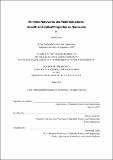| dc.contributor.advisor | Silvija Gradečdak. | en_US |
| dc.contributor.author | Zhou, Xiang, Ph. D. Massachusetts Institute of Technology | en_US |
| dc.contributor.other | Massachusetts Institute of Technology. Department of Materials Science and Engineering. | en_US |
| dc.date.accessioned | 2014-09-19T21:31:25Z | |
| dc.date.available | 2014-09-19T21:31:25Z | |
| dc.date.copyright | 2013 | en_US |
| dc.date.issued | 2014 | en_US |
| dc.identifier.uri | http://hdl.handle.net/1721.1/89962 | |
| dc.description | Thesis: Ph. D., Massachusetts Institute of Technology, Department of Materials Science and Engineering, June 2014. | en_US |
| dc.description | Cataloged from PDF version of thesis. "June 2014." | en_US |
| dc.description | Includes bibliographical references (pages 172-194). | en_US |
| dc.description.abstract | Gallium nitride (GaN) and indium gallium nitride (InGaN) nanowires promise potential for further improving the electricity-to-light energy conversion efficiencies in light emitting diodes due to strain relaxation, reduced density of structural defects, and easier light extraction. Material quality and effective band engineering of such III-nitride nanowires are crucial for the design and fabrication of their optoelectronic applications such as LEDs, lasers and photodetectors. In this thesis, we first demonstrate effective control over GaN nanowire size, growth rate and structural quality through careful choice of metal seed particles. The differences in morphology, structural defects and optical properties of GaN nanowires grown by metalorganic chemical vapor deposition were studied systematically by electron microscopy and photoluminescence, and related to supersaturation in different seed particles and nanowire nucleation mechanisms. These results also demonstrate that systematic screening of seed materials is essential for synthesizing nanostructures with defect-free structures and other functional heterostructures. Next, challenges for nanoscale mapping of band engineering were successfully addressed through direct spatial correlation of optical properties to a variety of III-nitride heterostructures grown by molecular beam epitaxy, including GaN p-n junction nanorods, InGaN nanodisks, and GaN quantum disks and quantum wires. We demonstrate that effective doping, alloying and quantum confinement can be readily achieved in nanowire heterostructures, by cathodoluminescence in scanning transmission electron microscopy. P-n junction position and carrier diffusion lengths inside a single GaN nanorod were determined with nanometer spatial resolution. InGaN disk compositional uniformities were quantified from their optical emissions, which revealed substantial compositional inhomogeneity in bottom-up synthesized nanostructures. The studies on optical properties of individual GaN quantum structures demonstrated that small differences in the degree of quantum confinements resulted in substantial changes in the optical band gap. More importantly, reduced light emissions are directly correlated to regions containing grain boundaries, dislocations and stacking faults, which were formed as a result of nanorod coalescence and fluctuations in growth environment during nanostructure synthesis. Our findings demonstrate that controlling compositional and structural homogeneity, understanding defect formation mechanism and their effects on materials properties are key challenges to be addressed for developing large scale functional devices based on bottom-up synthesized nanostructured materials. | en_US |
| dc.description.statementofresponsibility | by Xiang Zhou. | en_US |
| dc.format.extent | 194 pages | en_US |
| dc.language.iso | eng | en_US |
| dc.publisher | Massachusetts Institute of Technology | en_US |
| dc.rights | M.I.T. theses are protected by copyright. They may be viewed from this source for any purpose, but reproduction or distribution in any format is prohibited without written permission. See provided URL for inquiries about permission. | en_US |
| dc.rights.uri | http://dspace.mit.edu/handle/1721.1/7582 | en_US |
| dc.subject | Materials Science and Engineering. | en_US |
| dc.title | IIl-nitride nanowires and heterostructures : growth and optical properties on nanoscale | en_US |
| dc.type | Thesis | en_US |
| dc.description.degree | Ph. D. | en_US |
| dc.contributor.department | Massachusetts Institute of Technology. Department of Materials Science and Engineering | |
| dc.identifier.oclc | 890129100 | en_US |
